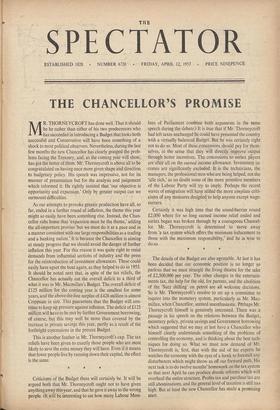THE CHANCELLOR'S PROMISE M R. THORNEYCROFT has done well. That it
should be he rather than either of his two predecessors who has succeeded in introducing a Budget that looks both successful and Conservative will have been something of .a shock to most political observers. Nevertheless, during the last few months the new Chancellor has clearly grasped the prob- lems facing the Treasury, and, as the coming year will show, has got the better of them. Mr. Thorneycroft is above all to be congratulated on having once more given shape and direction to budgetary policy. His speech was impressive, not for its manner of presentation but for the analysis and judgement which informed it. He rightly insisted that 'our objective is opportunity and expansion.' Only by greater output can we surmount difficulties.
As our attempts to provoke greater production have all, so far, ended in a further round of inflation, the theme this year might so easily have been something else. Instead, the Chan- cellor rubs home that 'expansion must be the theme,' adding the all-important proviso 'but we must do it at a pace and in a manner consistent with our large responsibilities as a trading and a banking nation.' It is because the Chancellor is aiming at steady progress that we should avoid the danger of further inflation this year. For this reason it was quite right to resist demands from influential sections of industry and the press for the reintroduction of investment allowances. These could easily have upset the boat again, as they helped to do in 1955. It should be noted next that, in spite of the tax reliefs, the Chancellor has actually cut the overall deficit to a third of what it was in Mr. Macmillan's Budget. The overall deficit of £125 million for the coming year is the smallest for some years, and the above-the-line surplus of £426 million is almost Crippsian in size. This guarantees that the Budget will con- tinue to keep up pressure against inflation. The deficit of £125 million will have to be met by further Government borrowing, of course, but this may well be more than covered by the increase in private savings this year, partly as a result of the forthright concessions in the present Budget.
This is another feather in Mr. Thorneycroft's cap. The tax reliefs have been given to exactly those people who are most likely to save the extra money they will have. Even if it means that fewer people live by running down their capital, the effect is the same.
Criticisms of the Budget there will certainly be. It will be argued both that Mr. Thorneycroft ought not to have given anything away this year, and that he gave it away to the wrong people. (It will be interesting to see how many. Labour Mem- bers of Parliament combine both arguments in the same speech during the debate.) It is true that if Mr. Thorneycroft had left taxes unchanged he could have presented the country wtih a virtually balanced Budget. But he was certainly right not to do so. Most of these concessions should pay for them- selves, in the sense that they will directly improve output through better incentives. The concessions to surtax payers are after all on the earned income allowance. Investment in- comes are significantly excluded. It is the technicians, the managers, the professional men who are being helped, not the `idle rich,' as no doubt some of .the more primitive members of the Labour Party will try to imply. Perhaps the recent waves of emigration will have stilled the more simpliste criti- cisms of any measures designed to help anyone except wage- earners.
Certainly it was high time that the sound-barrier round £2,000 where for so long earned income relief ended and surtax began was broken through by a courageous Chancel- lor. Mr. Thorneycroft is determined to move away from 'a tax system which offers the minimum inducement to those with the maximum responsibility,' and he is wise to do so.
The details of the Budget are also agreeable. At last it has been decided that our economic position is no longer so .parlous that we must strangle the living theatre for the sake of £2,500,000 per year. The other changes in the entertain- ments tax, the help for the old, for parents, and the abolition of the 'Suez shilling' on petrol are all welcome decisions. So is Mr. Thorneycroft's resolve to set up a committee to inquire into the monetary system, particularly as Mr. Mac- millan, when Chancellor, seemed unenthusiastic. Perhaps Mr. Thorneycroft himself is genuinely interested. There was a passage in his speech on the relations between the Budget, monetary policy, private savings and Government borrowing which suggested that we may at last have a Chancellor who himself clearly understands something of the problems of controlling the economy, and is thinking about the best tech- niques for doing so. What we must now demand of Mr. Thorneycroft is, first, that with the aid of his experts he watches the economy with the eyes of a hawk to forestall any disturbances which might throw us off our forward path. His next task is to do twelve months' homework on the tax system so that next April he can produce drastic reforms which will overhaul the entire structure. Profits tax and purchase tax are still abominations, and the general level of taxation is still too high. But at least the new Chancellor has made a promising start.


































 Previous page
Previous page